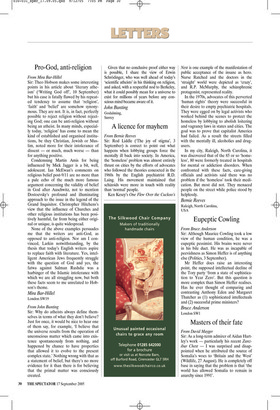Pro-God, anti-religion
From Mira Bar-Hillel
Sir: Theo Hobson makes some interesting points in his article about ‘literary atheism’ (‘Writing God off’, 10 September) but his case is fatally flawed by his repeated tendency to assume that ‘religion’, ‘faith’ and ‘belief’ are somehow synonymous. They are not. It is, in fact, perfectly possible to reject religion without rejecting God; one can be anti-religion without being an atheist. In many minds, especially today, ‘religion’ has come to mean the kind of established and organised institutions, be they Christian, Jewish or Muslim, noted more for their intolerance of dissent — or much, much worse — than for anything positive.
Condemning Martin Amis for being influenced by Mick Jagger is a bit, well, adolescent. Ian McEwan’s comments on religious belief post-9/11 are no more than a pale echo of the much more famous argument concerning the validity of belief in God after Auschwitz, not to mention Dostoevsky’s profound and illuminating approach to the issue in the legend of the Grand Inquisitor. Christopher Hitchens’s view that the influence of Churches and other religious institutions has been positively harmful, far from being either original or unique, is quite widespread.
None of the above examples persuades me that the writers are anti-God, as opposed to anti-religion. Nor am I convinced, Larkin notwithstanding, by the thesis that today’s English writers aspire to replace faith with literature. Yes, intelligent American Jews frequently struggle with the question of God and yes, the fatwa against Salman Rushdie was a harbinger of the Islamic intolerance with which we are all struggling now, but both these facts seem to me unrelated to Hobson’s theme.



















































 Previous page
Previous page